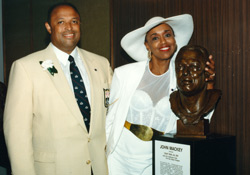John and Sylvia Mackey: A True Love Story
by Howard Balzer
Special to Profootballhof.com
Howard Balzer is a member of the Pro Football Hall of Fame’s Selection Committee. He is also with The Sports Xchange and is the Managing Editor and Lead Columnist for 101Sports.com and host of "Pro Football Sunday" on 101 ESPN. He can be followed on Twitter at @HBalzer721.
Where do I begin, to tell the story of how great a love can be?
The sweet love story that is older than the sea.
The simple truth about the love she brings to me.
Where do I start?
With her first hello!
She gave a meaning to this empty world of mine.
There'd never be another love, another time.
She came into my life and made a living fine.
She fills my heart ...
She fills my life with very special things,
where angel's soar, with wild imaginings.
She fills my soul with so much love,
that anywhere I go, I'm never lonely.
With her along, who could be lonely?
I reach for her hand, it's always there ...
How long does it last?
Can love be measured by the hours in a day?
I have no answers now, but this much I can say, I know I'll need her 'till the stars all turn away and she'll be there ...
She'll be there.
John Mackey died Wednesday night at the age of 69, but this "Love Story" lives on.
It is about the love a man had for football and the men who played it. It is about the love of a man for the woman he met in 1959 at Syracuse University and was with until the day he took his last breath.
 Perhaps most important, it is about the love Sylvia Mackey had for her husband, and how she was always there during a final decade when his dementia made him a shell of the man he had been.
Perhaps most important, it is about the love Sylvia Mackey had for her husband, and how she was always there during a final decade when his dementia made him a shell of the man he had been.
But, more than that, this story is about a man that excelled on the football field, while also being a leader in the early days of the NFLPA, fighting for free agency and the benefits those that followed him are still fighting for today.
It is also about the legacy he leaves behind, and that was also pushed forward by his wife, whose three-page letter to then-commissioner Paul Tagliabue in 2006 led to the "88 Plan" (88 was John Mackey's uniform number) and that created significant financial assistance for former players battling dementia.
As a player, Mackey revolutionized the tight-end position when he entered the NFL with the Baltimore Colts in 1963.
Former Colts coach Don Shula said, "Previous to John, tight ends were big strong guys like (Mike) Ditka and (Ron) Kramer who would block and catch short passes over the middle. Mackey gave us a tight end who weighed 230, ran a 4.6 and could catch the bomb. It was a weapon other teams didn't have."
The Colts used that weapon often. In his 10-year career, Mackey averaged 15.8 yards per reception, an impressive figure. That paled when measured against his scoring plays.
Of his 38 regular-season touchdown catches, nearly half (17) were 40 yards or more and 13 were 50 yards or more. Those 38 touchdowns averaged 38.4 yards. He added two playoff touchdowns of 49 and 75 yards, the latter occurring in Super Bowl V.
In 1966, six of his nine touchdown receptions were 51 yards or more, including 83- and 89-yard scoring plays. Those nine plays averaged 53.8 yards.
Yet, he wasn't elected to the Hall of Fame until 1992, 20 years after his retirement and in his final year of eligibility before potentially moving to the Senior's Committee.
 It has always been theorized that Mackey's union activities conspired against him when the Hall of Fame selection committee voted. It was dangerous for players to be team reps in those days, much less a union officer.
It has always been theorized that Mackey's union activities conspired against him when the Hall of Fame selection committee voted. It was dangerous for players to be team reps in those days, much less a union officer.
He became the NFLPA's first president in 1969, and served four years. After his retirement, he was the lead name of the 14 named plaintiffs in a 1976 antitrust suit filed against the NFL.
Ordell Braase, a former teammate and also an NFLPA president, once said, "We were a fractured group until John began putting permanence in (the union's) day-to-day operations. He had a vision for that job, which was more than just putting in time and keeping the natives calm. You don't get anything unless you really rattle the cage."
And John Mackey rattled the cage. But he wasn't a rebel as some characterized him. Presenting Mackey for induction into the Hall of Fame in 1992, Jack Kemp said, "I really believe that it is a mistake to call John Mackey a rebel. He wasn't a rebel. He was a catalyst. He was not rebellious. He was a leader."
That's how he is remembered today.
NFLPA Executive Director DeMaurice Smith said Thursday, as he and Commissioner Roger Goodell again began talks aimed at ending the league lockout, "John Mackey is still our leader. As the president of the NFL Players Association, he led the fight for fairness with a brilliance and ferocious drive. His passion continues to define our organization and inspire our players.
"John Mackey has inspired me and will continue to inspire our players and define our institution. His unwavering loyalty to our mission and his exemplary courage will never be forgotten."
In an NFL statement, Goodell said, "John Mackey was one of the great leaders in NFL history, on and off the field. He was a Hall of Fame player who redefined his position. John was a courageous advocate for his fellow NFL players as head of the NFL Players Association.
"He worked closely with our office on many issues through the years, including serving as the first president of the NFL Youth Football Fund. He never stopped fighting the good fight. Our thoughts are with Sylvia and the Mackey family on the loss of our good friend."
John Mackey was still in his late 50s when dementia began affecting his daily existence. It was a few years until the particularly devastating diagnosis of frontal temporal dementia was made.
They moved from San Diego, where his career ended in 1972, back to Baltimore. Sylvia Mackey made sure to take her husband to special events as well as Canton each summer even as his condition deteriorated.
She went back to work as a flight attendant for the income and health insurance. It was finally in the spring of 2006, after realizing she was not alone, that Sylvia Mackey wrote that letter to Tagliabue.
In it, she detailed the impending financial crisis she and others would face and noted that dementia "is a slow, deteriorating, ugly, caregiver-killing, degenerative, brain-destroying tragic horror."
The "88 Plan" was the result, a program that provides $88,000 a year for those in assisted facilities and $50,000 for those cared for at home. In the last year or so, John Mackey lived in the Keswick Memory Care Center in Baltimore.
In an interview after the "88 Plan" became reality, she said, "I have been approached many times by lawyers who wanted to use me in a lawsuit. I turned them all down, and I'm glad I did. This is better, because everyone who is affected will benefit, whether they were stars or Hall of Famers or just regular players."
Meanwhile, in one recent year, Sylvia Mackey testified before Congress and spoke numerous times at seminars put on by the Morehouse School of Medicine and the NFL.
Said Morehouse's Sharon Rachel then, "I don't know where she finds the time or the energy to do everything she does. She truly is a remarkable woman and has done an incredible job looking out not only for John but for so many other football players and their families who are dealing with these tragic circumstances."
At the same time, research was beginning at the Boston University School of Medicine (BUSM), which houses the Center for the Study of Traumatic Encephalopathy (CSTE).
Exceptional work has been done there, studying the brains of former NFL players and discovering the effect that brain injuries have on players. It has helped lead to a sea change in the way the NFL now handles concussions.
Over the last few years, numerous current and past NFL players have pledged their brains be given to the center upon their death. Sylvia Mackey was at the top of that list.
She said then, "It is probably too late for this research to help John, as his dementia has advanced to the point that he cannot speak. However, I hope the CSTE scientists can learn from John so that fewer football families are exposed to this terrible disease."
Dr. Robert Cantu, a clinical professor of neurosurgery at BUSM, said, "We are thankful to Mrs. Mackey for her support of our research and for her years of advocacy for the countless retired athletes who suffer from brain diseases like her husband. Because of her support of our research, and because of the growing number of athletes participating in our brain donation registry, we will be able to determine the specific risk factors for CTE and potentially develop effective treatments. The research will foster education and allow meaningful guidelines to be implemented at all levels of athletic participation."
After the "88 Plan" became reality, Sylvia Mackey said, "I told John he has become the poster child for a solution to this problem. His greatness on the football field is always going to be his biggest legacy. But this is No. 2."
Those that have already been helped and those that will be helped in the future just might put it at No. 1.
As sad as this time is for Sylvia Mackey, which are her first days in 52 years without the love of her life, her heart is surely filled with pride for the good she has done.
Meanwhile, John Mackey is probably looking down from his newfound karaoke spot in heaven, and singing, "She'll be there."
Sylvia Mackey always was, and always will be.
More From Profootballhof.com:
Canton or Bust: Colts fans wins trip
A season ticket holder of the Indianapolis Colts has won the Canton or Bust Sweepstakes. The grand prize includes a trip for two to the 2011 Pro Football Hall of Fame Enshrinement Festival, $1,000 Hall of Fame Store gift card and more
Mackey goes long in ‘66
Hall of Fame tight end John Mackey went long and stretched the field in a memorable 1966 season that saw him score 6 of his 9 TD receptions from more than 50 yards.


